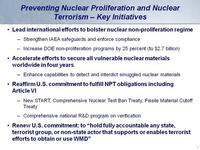-
Three leading African terrorist groups: similarities and differences
Three African Islamist terrorist organizations — al-shabaab, al-Qaeda in the Maghreb, and Boko Haram – have been responsible for many acts of terrorism. The three groups, or at least their leaders and most of their followers, adhere to a Wahhabi version of Islam, which is practiced in Saudi Arabia, and all oppose Western influence in the countries in which they operate. The groups also share a penchant for internal factional violence, and senior leaders of both al Shabab and Boko Haram were recently killed by rivals. There are, however, important differences among the three groups.
-
-
Aerospace and Defense Industry says its member companies negatively affected by shutdown
The Aerospace Industries Association called on Congress and President Obama to pass a bipartisan solution that reopens the government as soon as possible. The association’s president said that the negative impacts of the shutdown range from industry worker furloughs on programs that support the soldiers to delays in new aircraft certification and space systems launches.
-
-
Shutdown affects U.S. military religious services

A shortage of active duty Catholic chaplains has led the government to hire contract priests to offer religious services in the military. As a result of the government partial shutdown, the military has furloughed as many as fifty Catholic chaplains. They were not allowed to celebrate weekend Mass, and some were told that they would not be allowed to volunteer their services. Catholic organizations said they were outraged by the decision, which some saw as an expression of what they described as the administration’s animus toward Catholics. Observers note, however, that the Anti-Deficiency Act (ADA), which codifies the Constitutional requirement that the executive not draw money from the treasury unless authorized by Congress, specifically restricts acceptance of voluntary services or personal services beyond authorized levels “except for emergencies involving the safety of human life or the protection of property.”
-
-
Gov. Jerry Brown: only U.S. citizens on juries
In recent days, Governor Jerry Brown of California approved bills allowing driver’s permits to illegal immigrants and allowing illegal immigrants with a law degree to practice law in the state. Yesterday, however, he drew a tight line around jury service by vetoing a bill which would have made it possible for legal immigrants who are not citizens to serve on juries.
-
-
House Dems propose comprehensive immigration bill
House Democrats last week released a proposed immigration bill aiming to tighten border security and provide a path to citizenship for millions of undocumented immigrants. The House Judiciary Committee has advanced several bills offering narrower changes to the current immigration law. It is not clear whether the rancor characterizing the budget debate would allow for a bipartisan consideration of either side’s immigration legislative preferences.
-
-
Libya condemns U.S. capture of al-Ruqai
The Libyan government on Sunday harshly criticized what it described as the “kidnapping” of one of its citizens after U.S. Specia Forces captured al Qaeda senior leader Nazih Abdul-Hamed al-Ruqai. The Libyan military indicated it was not privy to the U.S. operation. Libya does not have a functioning central government, except in name, and U.S. efforts to shore up the weak and demoralized Libyan security services and train them in counterterrorism have yet to bear fruit. Other problems with Libyan security services are corruption, and the fact that many in the security services are more loyal to their clan or tribe than to the government they serve. This is why even Libya’s military leaders, who have received counterterrorism training and funding from the United States, have not been informed of the operation in advance.
-
-
Costly DOE uranium processing facility questioned

The cost of a proposed Department of Energy’s uranium processing facility for nuclear weapons at theY-12 National Security Complex in Oak Ridge, Tennessee has increase nineteen times – from the original estimate of $600 million to $11.6 billion. If these estimates are accurate, the processing facility would entail one the largest investments in the U.S. nuclear weapons infrastructure since the Manhattan Project.
-
-
$5 million NSF grant focuses on nuclear threat inspection
Penn State University has received a 5-year grant from the National Science Foundation (NSF) and DHS for nuclear threat inspection, as part of a team led by the Massachusetts Institute of Technology and including Georgia Tech. The grant will help develop new systems and sensors that will help detect nuclear weapons, special nuclear materials, radiation dispersal devices, and related threats.
-
-
Helping farmers plow through new, complex food safety regulations
The recently passed Food Safety Modernization Act set safety standards on how farmers grow, harvest, and handle fresh produce to reduce the risk of foodborne diseases. The new regulations to minimize food safety risk include testing for water safety and better managing manure storage. Agricultural extension educators should take a flexible approach in teaching farmers about the changing landscape of food safety regulations, researchers say.
-
-
U.S. Special Forces kill al Shabab leader in Somalia, capture al Qaeda fugitive in Libya
A Navy SEAL team attacked – and, in all likelihood, killed — a senior al-Shabab leader in an early Saturday raid on his seaside villa in the Somali town of Baraawe, 150 miles south of the capital Mogadishu. American officials said the raid was in response to the militant group’s attack on the Westgate shopping mall in Nairobi three weeks ago. This was the most significant raid by American troops on Somali soil since commandos killed Saleh Ali Saleh Nabhan, a Qaeda mastermind, near the same town in 2009. In a separate raid, U.S. commandos captured Nazih Abd al Hamid al-Ruqhay, known by his nom de guerre, Abu Anas el-Liby, a senior leader of al Qaeda indicted in the 1998 bombings of the United States embassies in Kenya and. The capture ends a 15-year manhunt. El-Liby, since 2000, has been high on the list of the U.S. government’s most-wanted list, and the FBI had placed a $5 million reward on his head.
-
-
How DHS copes with shutdown requirements
In anticipation of a government shutdown, DHS, on 27 September 2013, has issued a 42-page document, titled “Procedures Relating to a Federal Funding Hiatus,” which details which of DHS functions and activities would cease during what the document calls a “federal funding hiatus,” and which functions and activities are exempt, or “excepted,” and would thus continue. In general, mission-essential and mission-critical functions of DHS will continue during the funding hiatus. DHS defines essential functions as “a limited set of mission-essential or mission-critical functions that must be performed to provide continuity of operations.” DHS defines mission-critical personnel as “those employees occupying positions and performing functions that must be maintained under all circumstances to ensure the safety and security of the nation and its citizens.”
-
-
Immigration court cases in limbo during government shutdown
The shutdown of the U.S. federal government has left hundreds of thousands of immigration cases in limbo. Immigration lawyers note that it is likely that political asylum cases and deportation cases would be deemed non-urgent, and could thus be put off for months if the government shutdown continues. “Situations change. Memories fade. Evidence gets lost,” one immigration lawyer said. “If you have a court date now, and it is kicked off the calendar, it could be a matter of life and death.”
-
-
Government shutdown stymies U.S. science agencies
A U.S. Government furloughs affecting virtually all National Science Foundation (NSF) employees and three-fourths of those at the National Institutes of Health could impact American competitiveness, the American Association for the Advancement of Science (AAAS) warned. “If the government shutdown continues for a week or more, it is going to make the United States less desirable as an international research collaborator,” said an AAAS representative. “When funding is no longer reliable, many of our research partners may be unable to continue collaborating with us. That could eventually have longer-term impacts on American innovation and competitiveness.”
-
-
A state of disrepair: Thousands of U.S. aging bridges risk collapse
Of the 607,380 bridges listed in the recent U.S. National Bridge Inventory, 65,605 bridges are classified as “structurally deficient” and 20,808 as “fracture critical,” with 7,795 of those bridges designated as both structurally deficient and fracture critical. Experts say this indicates significant disrepair and a risk of collapse. These 7,795 structurally deficient, fracture critical bridges carry more than twenty-nine million drivers a day.
-
-
Preventing nuclear terrorism

Nuclear terrorism remains a real and urgent threat. Despite an array of mechanisms established to combat this threat, several serious problems persist, requiring relentless attention and actions by the United States, Russia, and other responsible nations. These problems include continuing nuclear security vulnerabilities in a number of countries and the continued incidents of illicit trafficking in nuclear materials, radioactive sources, and the various components.
-
More headlines
The long view
Factories First: Winning the Drone War Before It Starts
Wars are won by factories before they are won on the battlefield,Martin C. Feldmann writes, noting that the United States lacks the manufacturing depth for the coming drone age. Rectifying this situation “will take far more than procurement tweaks,” Feldmann writes. “It demands a national-level, wartime-scale industrial mobilization.”
No Nation Is an Island: The Dangers of Modern U.S. Isolationism
The resurgence of isolationist sentiment in American politics is understandable but misguided. While the desire to refocus on domestic renewal is justified, retreating from the world will not bring the security, prosperity, or sovereignty that its proponents promise. On the contrary, it invites instability, diminishes U.S. influence, and erodes the democratic order the U.S. helped forge.
Fragmented by Design: USAID’s Dismantling and the Future of American Foreign Aid
The Trump administration launched an aggressive restructuring of U.S. foreign aid, effectively dismantling the United States Agency for International Development (USAID). The humanitarian and geopolitical fallout of the demise of USAID includes shuttered clinics, destroyed food aid, and China’s growing influence in the global south. This new era of American soft power will determine how, and whether, the U.S. continues to lead in global development.
Water Wars: A Historic Agreement Between Mexico and US Is Ramping Up Border Tension
As climate change drives rising temperatures and changes in rainfall, Mexico and the US are in the middle of a conflict over water, putting an additional strain on their relationship. Partly due to constant droughts, Mexico has struggled to maintain its water deliveries for much of the last 25 years, deliveries to which it is obligated by a 1944 water-sharing agreement between the two countries.
How Disastrous Was the Trump-Putin Meeting?
In Alaska, Trump got played by Putin. Therefore, Steven Pifer writes, the European leaders and Zelensky have to “diplomatically offer suggestions to walk Trump back from a position that he does not appear to understand would be bad for Ukraine, bad for Europe, and bad for American interests. And they have to do so without setting off an explosion that could disrupt U.S.-Ukrainian and U.S.-European relations—all to the delight of Putin and the Kremlin.”
How Male Grievance Fuels Radicalization and Extremist Violence
Social extremism is evolving in reach and form. While traditional racial supremacy ideologies remain, contemporary movements are now often fueled by something more personal and emotionally resonant: male grievance.
